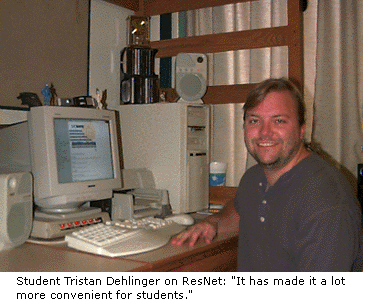

Volume 6, No 3  Information Technology News of the University of California,
Davis
Information Technology News of the University of California,
Davis  November
1997
November
1997
 |
ResNet Brings New Opportunitiesby Aviva LuriaMonica Fuller is a self-described "advocate for ResNet." A senior who has lived in the residence halls for three years, Fuller is pleased with the speed of her direct connection to the campus network. And happy to be rid of her modem. "I got frequently disconnected," she says of her former modem connection. "I think it was just a little bit slower and noisier. If you wanted to use it at 2 a.m. you'd be waking up your neighbors. It makes that connecting noise and sometimes can be a little distracting." And now she can get all her phone calls. "I don't have to worry about my modem keeping my line busy," she says. Fuller connects directly to the campus network via ResNet, a data and video network being made available to UC Davis Student Housing residents for the first time this Fall Quarter. Each student in the traditional residence halls (Segundo, Tercero, and Cuarto) has access to a direct connection to the campus fiber-optic infrastructure. (Emerson and Webster Halls, in the Cuarto area, will be undergoing seismic renovation and are not yet participating in ResNet.) Student Housing conceived the residence hall network as a way to support students' academic needs. "Having speedy access to the Internet is almost mandatory [for students] at this point, and certainly will be within several years. We looked at it as a really good service, something that as time goes on will just be an expected service, almost like having a telephone is expected," said Lisa Papagni, Coordinator of Technology and Media Resource Centers for Student Housing. To freshman Scott Wakeham, having a fast connection has made the transition to college life easier. "It's helped the whole freshman adjustment period for me. It's the first time I've been on my own for real. Adjusting to that, you get kind of homesick for everyone you knew at home. Having the ability to talk to them and ask them how it's going for them makes me realize that everyone's going through the same thing, and that makes it easier." A direct connection makes communication more convenient and helps save on phone bills, he said. As more and more classes rely on the Internet for communication between instructors and students - whether by means of the World-Wide Web, email, or newsgroups - having access to a fast and reliable connection becomes a greater necessity. "Right now is when I really need the speed because I'm starting to do more on the World-Wide Web," Fuller said. "I'm doing grad school searches, research on the Web, surfing the Web for free stuff. ResNet helps me speed up that work." Senior Tristan Dehlinger, who has a double-major in sociology and psychology, also has increased the amount of research he does over the Internet. And he credits ResNet. "It's made it a lot more convenient for students," he said. Electronic mail is becoming a primary communication tool for Dehlinger. In one of his classes, he has submitted all his homework and writing assignments by email, and his professor emails back his grades. As a Resident Assistant in Ryerson Hall, Dehlinger communicates with many campus resources, almost entirely by email. "I prefer email [to the phone]. I know they got a message. I know they'll get back to me when it's convenient for them. I'm not put on hold. It's a lot more reliable than trying to get hold of someone by phone," he said. 
According to Student Housing records, approximately 55% of students residing in halls with ResNet ready connections arrived on campus with their own computers. Of that number, roughly 84% (or 1,382 students) are using ResNet. Students like Fuller and Dehlinger configured their own systems using the self-help instructions provided by Student Housing by mail and via the ResNet Web site. The "ResNet Connect" support program was available to residents at the start of Fall Quarter, providing free assistance ("Tier 1") to those with recommended and network-ready computers. Residents needing additional help were referred by Tier 1 consultants to the fee-for-service Tier 2 support team. "More students than we anticipated did come prepared for ResNet with a network-ready system," Papagni said. "That meant that within three days we were able to connect a huge percentage of the students. We actually shut down the Tier 1 support system for a period of time because they were walking around with nothing to do. It was that effective." Dehlinger estimates that 75% of the students living on his floor have computers and are using ResNet. But Fuller, who worked as a Tier 1 consultant, said there were some students who chose not to connect directly. "They couldn't upgrade, didn't want to upgrade," she said. "I think some of them couldn't afford to. Others were going to get a new computer the following year and didn't see investing the money." About 16% of residents with computers had equipment incompatible with ResNet or chose not to use it, according to Student Housing. Older operating systems, pieced-together equipment, and incompatible ethernet cards were some reasons for difficulties. There are alternatives to ResNet: students can connect via modem, or can use the Learning Resource Centers (computer labs open only to Student Housing residents) or the campus computer classrooms. Construction continues, and sometime during the Winter Quarter students will have access to a closed circuit television system and cable service. A broadcasting studio will allow students to create their own programming, and the Housing Office will collaborate with other campus departments to produce educational programs. For More Information:
|